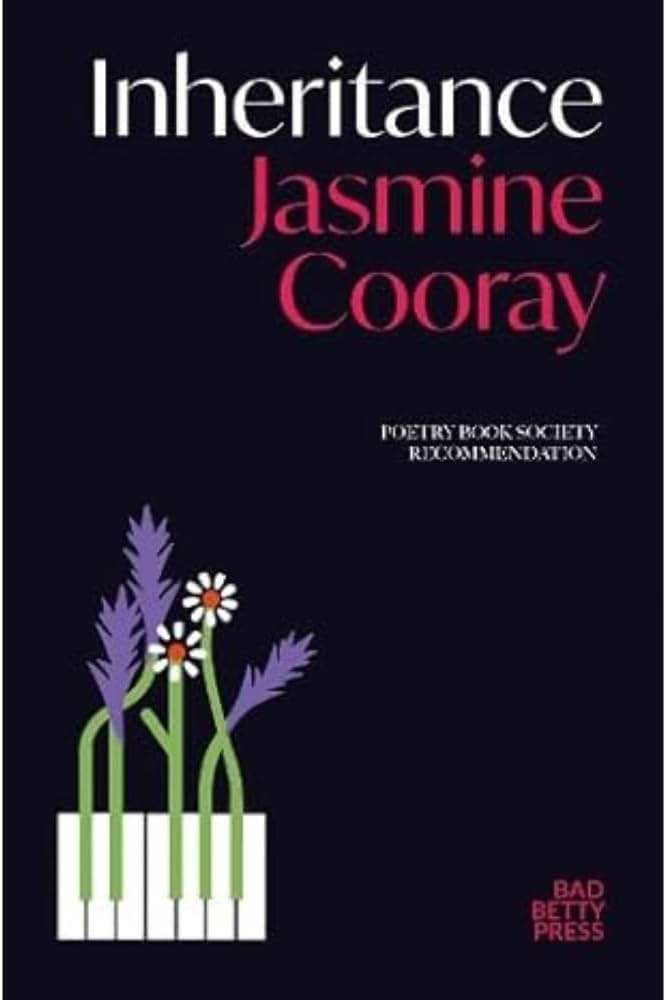Inheritance (Shortlisted, Forward Prizes for Best First Collection)
Jasmine Cooray
(Bad Betty Press, 2023); pbk, £10.99
Jasmine Cooray’s debut poetry collection, Inheritance, is nominated for the Forward’s Felix Dennis Prize for Best First Collection. Besides being a poet, she is also a psychotherapist, BBC Performing Arts Fellow, and former National University of Singapore Writer In-Residence. She has published and performed her poetry since the early 2000s.
Cooray’s writing is highly descriptive without feeling overwhelming. She infuses each image with weighty personal connections that convey her unique experiences, and yet, these feel accessible and universal at the same time. For example, ‘Elders of the Pot’ includes specific details unique to her Sri Lankan heritage, but the reader can easily insert themselves into the space, imagining their kitchens, their family’s ingredients, and their own stained wooden spoons.
You can smell it down the street, fenugreek and Impulse
fighting it out beneath your school uniform. If we lost our
way,
still we could fumble back, follow those olfactory tonesuntil our noses found the door, the hob, the pot, the lid.
What is home but a map you don’t need? You sneak a taste.
To know it’s ready is the only language you have.(‘Elders of the Pot’)
The collection’s theme of ‘inheritance’ permeates most poems, but it is not limited to one’s ancestors; instead, Cooray explores the ways in which we inherit grief, joy, and memory from everyone in our lives. The collection is divided into four sections and each section’s title poem exemplifies the themes explored within that part. In the section-title poem, ‘Aurora Borealis’, Cooray explores the grief of her father’s passing, writing, ‘I didn’t yet know the ways/in which he would return.’ Other poems this section, such as ‘Visitor’, recount the ways in which memories of her father return to her in unexpected places: in a stranger walking in the park, in an egg yolk, at her sister’s graduation. This section focuses largely on her father and thready connections to her Sri Lankan ancestry which funnels down into her everyday life and seeps into each poem.
Poems in ‘World of Wildflowers’ explore grief and loss in many forms too: those who have died, the loss of relationships, the loss of self, and aching for someone far away such as in ‘Song for Absent Loves’. ‘Elegy for a Wedding’ depicts the speaker’s transition from planning a wedding with someone to planning a funeral for them, tying marital symbols to funerary ones; there is a forceful grieving for the future they did not get:
I dressed for your funeral like
it was a wedding / our friends and families on pews / at
least they saw us together once / I spoke / vows disguised
as eulogy / the groom dressed in a box / the bride in a
veil of steel(‘Elegy for a Wedding’)
‘Sweet Milk’ is the only section to take on a different form, appearing as a long poem in six parts. Motherhood pervades this section, with the first and last parts depicting the speaker’s mother sharing close, intimate moments with other children, book-ending the long poem with a gap in their relationship. In part one, her mother sits reading with another child, leaving the speaker to wonder what love will be left for her. In part six, her mother helps her sister as a new mother, sharing an intimacy that is clear the speaker feels she will not experience:
I watch from the plastic chair, my womb full
of words. I do not know what else it can host(‘Sweet Milk, vi’)
This poem delineates an emotional distance between the speaker and her mother. Is this the ‘inherited’ space between her and other women in her life? Other women appear throughout this section much more so than in the other parts of the collection. ‘Sweet Milk’ also mentions a grandmother, a friend’s mother, and a sister, none of whom are directly named in other poems.
The final section, ‘Years That Ask Questions and Years That Answer’ attends to bigger moments in life that fundamentally change you. But Cooray presents these moments as coming in all shapes: connecting with a valued friend, losing someone to illness, falling in love with yourself. The penultimate poem in this collection, ‘Bad Hosting’, ripped through me. This poem teaches one to be hopeful in times of despair, in those years which ask all the difficult/challenging questions. The poem is a gentle caress of the self in times of need: when it feels too hard to wash the cup, one should get up and set the table ‘in case the future arrives’.
Taylor Jeoffroy


Leave a Reply